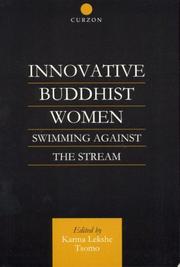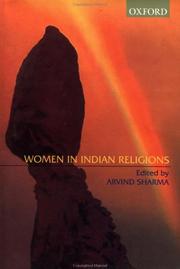| Listing 1 - 10 of 32 | << page >> |
Sort by
|
Book
ISBN: 9045302233 Year: 2003 Publisher: 's-Gravenhage BZZTôH
Abstract | Keywords | Export | Availability | Bookmark
 Loading...
Loading...Choose an application
- Reference Manager
- EndNote
- RefWorks (Direct export to RefWorks)
Religious studies --- Indian religions --- Members of congregations --- Spirituality --- Buddhism --- Book
Book
Year: 1989 Publisher: Boston Shambhala Boston & Shaftesbury
Abstract | Keywords | Export | Availability | Bookmark
 Loading...
Loading...Choose an application
- Reference Manager
- EndNote
- RefWorks (Direct export to RefWorks)
In haar meer dan honderd jaar lange bestaan was Alexandra David-Néel zowel operazangeres, als politiek-anarchiste, zowel ontdekkingsreizigster (ze is veertien jaar door Tibet getrokken) als de auteur van meer dan 40 boeken. Zo schreef ze onder meer over haar spirituele zoektocht naar het Tibetaanse boeddhisme. In dit biografische boek ligt de nadruk op de fysieke, geestelijke en sociale barrières die ze heeft moeten overwinnen om boeddhiste te kunnen worden.
Indian religions --- Tourism --- Biography --- Buddhism --- Book --- David-Neel, Alexandra

ISBN: 0691091706 0691091714 9786612158438 1282158430 140082561X 9780691091716 9780691091709 Year: 2003 Publisher: Princeton (N.J.) : Princeton university press,
Abstract | Keywords | Export | Availability | Bookmark
 Loading...
Loading...Choose an application
- Reference Manager
- EndNote
- RefWorks (Direct export to RefWorks)
Innumerable studies have appeared in recent decades about practically every aspect of women's lives in Western societies. The few such works on Buddhism have been quite limited in scope. In The Power of Denial, Bernard Faure takes an important step toward redressing this situation by boldly asking: does Buddhism offer women liberation or limitation? Continuing the innovative exploration of sexuality in Buddhism he began in The Red Thread, here he moves from his earlier focus on male monastic sexuality to Buddhist conceptions of women and constructions of gender. Faure argues that Buddhism is neither as sexist nor as egalitarian as is usually thought. Above all, he asserts, the study of Buddhism through the gender lens leads us to question what we uncritically call Buddhism, in the singular. Faure challenges the conventional view that the history of women in Buddhism is a linear narrative of progress from oppression to liberation. Examining Buddhist discourse on gender in traditions such as that of Japan, he shows that patriarchy--indeed, misogyny--has long been central to Buddhism. But women were not always silent, passive victims. Faure points to the central role not only of nuns and mothers (and wives) of monks but of female mediums and courtesans, whose colorful relations with Buddhist monks he considers in particular. Ultimately, Faure concludes that while Buddhism is, in practice, relentlessly misogynist, as far as misogynist discourses go it is one of the most flexible and open to contradiction. And, he suggests, unyielding in-depth examination can help revitalize Buddhism's deeper, more ancient egalitarianism and thus subvert its existing gender hierarchy. This groundbreaking book offers a fresh, comprehensive understanding of what Buddhism has to say about gender, and of what this really says about Buddhism, singular or plural.
Women --- Sex --- Buddhism --- Femmes --- Sexualité --- Bouddhisme --- Religious aspects --- Buddhism. --- Doctrines. --- Aspect religieux --- Doctrines --- Sexualité --- Indian religions --- Social problems --- Sociology of the family. Sociology of sexuality --- Religious studies --- Woman (Buddhism) --- Buddhist doctrines --- Buddhist theology --- Lamaist doctrines --- Women - Religious aspects - Buddhism. --- Sex - Religious aspects - Buddhism. --- Buddhism - Doctrines. --- Gender --- Misogyny --- Members of congregations --- Book

ISBN: 0700712534 Year: 2000 Publisher: Richmond : Curzon,
Abstract | Keywords | Export | Availability | Bookmark
 Loading...
Loading...Choose an application
- Reference Manager
- EndNote
- RefWorks (Direct export to RefWorks)
J1843 --- J4176 --- Japan: Religion -- Buddhism -- priesthood (priests, monks, nuns) --- Japan: Sociology and anthropology -- gender roles, women, feminism --- Buddhist women. --- Women in Buddhism. --- Indian religions --- Religious studies --- Tibet --- East Asia --- South Asia --- Southeast Asia --- Hawaii --- Buddhist women --- Women in Buddhism --- Buddhism --- Women, Buddhist --- Women --- Members of congregations --- Book --- Edited volume --- Hawaii [state]

ISBN: 0195646347 Year: 2002 Publisher: New Delhi Oxford University Press
Abstract | Keywords | Export | Availability | Bookmark
 Loading...
Loading...Choose an application
- Reference Manager
- EndNote
- RefWorks (Direct export to RefWorks)
Religious studies --- Christian religion --- Indian religions --- Islam --- Hinduism --- Religion --- Religious communities --- Buddhism --- Book --- Christianity --- India
Book
Year: 2012 Publisher: Oxford Oxford University Press
Abstract | Keywords | Export | Availability | Bookmark
 Loading...
Loading...Choose an application
- Reference Manager
- EndNote
- RefWorks (Direct export to RefWorks)
Religious studies --- Indian religions --- Sociology of the family. Sociology of sexuality --- Motherhood --- Religion --- Buddhism --- Book --- India
Book
ISBN: 9781479803415 1479803413 9781479803422 1479803421 9781479803453 1479803448 1479803456 Year: 2020 Publisher: New York: New York University press,
Abstract | Keywords | Export | Availability | Bookmark
 Loading...
Loading...Choose an application
- Reference Manager
- EndNote
- RefWorks (Direct export to RefWorks)
Buddhist traditions have developed over a period of twenty-five centuries in Asia, and recent decades have seen an unprecedented spread of Buddhism globally. From India to Japan, Sri Lanka to Russia, Buddhist traditions around the world have their own rich and diverse histories, cultures, religious lives, and roles for women. Wherever Buddhism has taken root, it has interacted with indigenous cultures and existing religious traditions. These traditions have inevitably influenced the ways in which Buddhist ideas and practices have been understood and adapted. Tracing the branches and fruits of these culturally specific transmissions and adaptations is as challenging as it is fascinating. Women in Buddhist Traditions chronicles pivotal moments in the story of Buddhist women, from the beginning of Buddhist history until today. The book highlights the unique contributions of Buddhist women from a variety of backgrounds and the strategies they have developed to challenge patriarchy in the process of creating an enlightened society. Women in Buddhist Traditions offers a groundbreaking and insightful introduction to the lives of Buddhist women worldwide.
Women in Buddhism. --- Buddhist women. --- Indian religions --- Sociology of the family. Sociology of sexuality --- Women, Buddhist --- Women --- Buddhism --- Bhikkhuni. --- Buddhist acculturation. --- Buddhist activism. --- Buddhist cultures. --- Buddhist feminism. --- Buddhist nuns. --- China. --- Engaged Buddhism. --- Mahāprajāpatī. --- Mongolian Buddhism. --- Patriarchy. --- Saṅghamittā. --- South Asia. --- Southeast Asia. --- Tibetan Buddhism. --- Tibetan diaspora. --- Western Buddhism. --- bhikkhuni lineage. --- bhikkhuni ordination. --- bhikkhunī saṅgha. --- cultural adaptation. --- female renunciants. --- feminism. --- feminist reflection. --- gender anthropology. --- gender equity. --- geshe degree. --- monastic life. --- monastic ordination. --- nuns. --- ordination lineage. --- ordination lineages. --- religious legitimacy. --- religious women. --- renunciant women. --- social activism. --- social engagement. --- structural injustice. --- vinaya. --- women practitioners. --- women’s activism. --- women’s history. --- women’s movements. --- women’s ordination. --- Patriarchy --- Religion --- Feminist struggle --- Book
Book
ISBN: 9026303513 Year: 1976 Publisher: Baarn Uitgeverij Ambo
Abstract | Keywords | Export | Availability | Bookmark
 Loading...
Loading...Choose an application
- Reference Manager
- EndNote
- RefWorks (Direct export to RefWorks)
#gsdb10 --- C1 --- vrouwen --- retraites --- Kerken en religie --- Cognitive psychology --- Indian religions --- Meditation --- Buddhism --- Book --- Diary --- Personal documents
Book
Year: 2009 Publisher: Berkeley University of California Press
Abstract | Keywords | Export | Availability | Bookmark
 Loading...
Loading...Choose an application
- Reference Manager
- EndNote
- RefWorks (Direct export to RefWorks)
Religious studies --- Indian religions --- Sociology of the family. Sociology of sexuality --- Feminism --- Gender --- Methodology --- Religion --- Theology --- Buddhism --- Book
Book
ISBN: 2708236423 9782708236424 Year: 2002 Publisher: Paris: Éd. de l'Atelier,
Abstract | Keywords | Export | Availability | Bookmark
 Loading...
Loading...Choose an application
- Reference Manager
- EndNote
- RefWorks (Direct export to RefWorks)
De vrouw…de helft van de mensheid, het alter-ego van de man, Wat is de betekenis van dit seksuele verschil dat een van de sleutels vormt van het begrip van de mensheid? Wat betekent het om vrouw te zijn vandaag, na eeuwen van mannelijke dominantie? Om te antwoorden op deze vragen stelt de auteur voor om een licht te werpen op de filosofie en religies. Men ontdekt dat de oorspronkelijke gelijkheid van man en vrouw voor God door alle bronteksten van de grote religieuze tradities verkondigd wordt. Er is echter een duidelijke discrepantie tussen dit principe en de realiteit in de geschiedenis. Het is waar dat de religieuze macht in de eerste plaats en nog steeds een mannenzaak is.
Indian religions --- Christian religion --- Islam --- Jewish religion --- Sociology of the family. Sociology of sexuality --- Religious studies --- Hinduism --- Judaism --- Religion --- Images of women --- Buddhism --- Book --- Christianity
| Listing 1 - 10 of 32 | << page >> |
Sort by
|

 Search
Search Feedback
Feedback About UniCat
About UniCat  Help
Help News
News